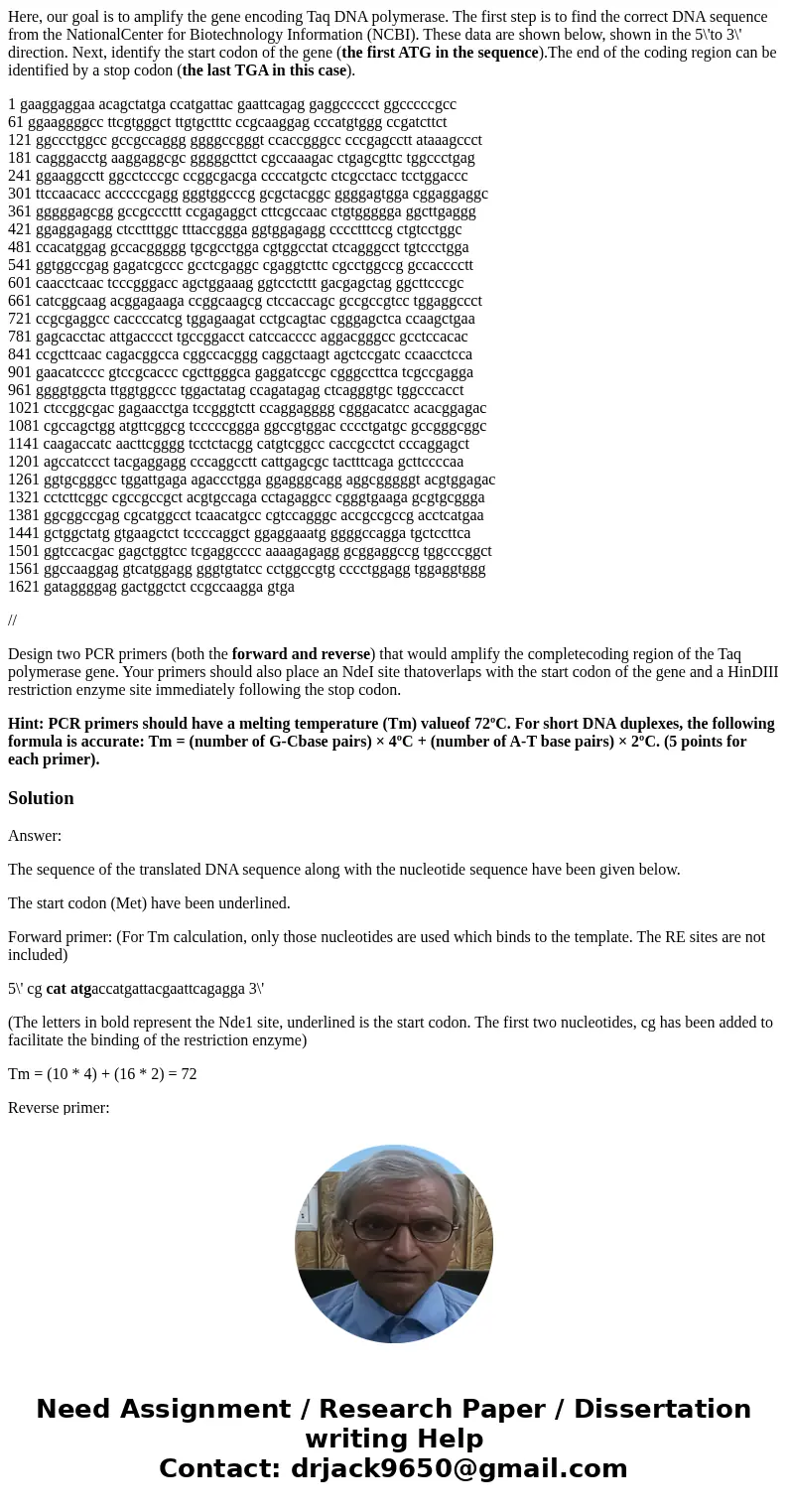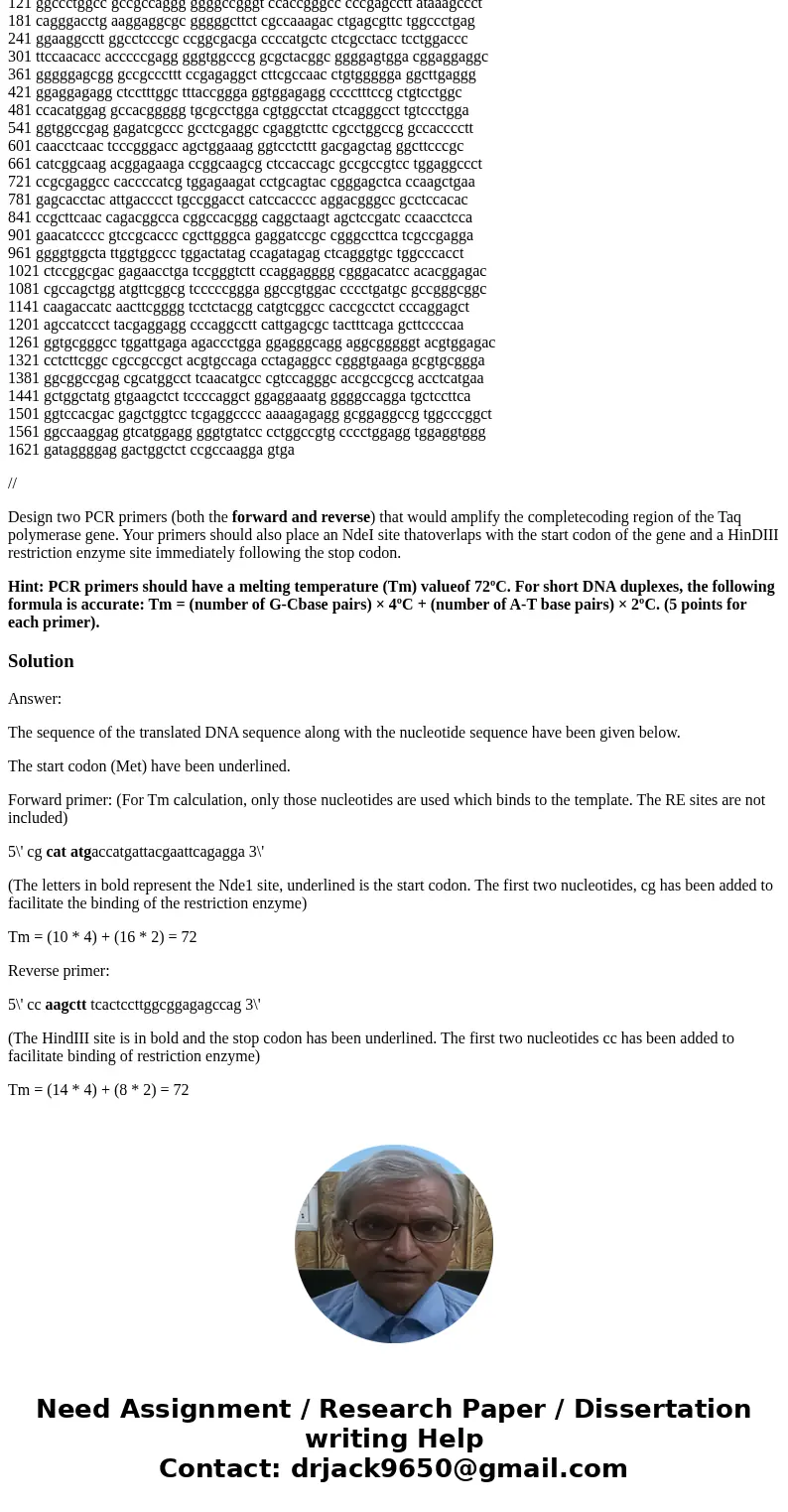Here our goal is to amplify the gene encoding Taq DNA polyme
Here, our goal is to amplify the gene encoding Taq DNA polymerase. The first step is to find the correct DNA sequence from the NationalCenter for Biotechnology Information (NCBI). These data are shown below, shown in the 5\'to 3\' direction. Next, identify the start codon of the gene (the first ATG in the sequence).The end of the coding region can be identified by a stop codon (the last TGA in this case).
1 gaaggaggaa acagctatga ccatgattac gaattcagag gaggccccct ggcccccgcc
61 ggaaggggcc ttcgtgggct ttgtgctttc ccgcaaggag cccatgtggg ccgatcttct
121 ggccctggcc gccgccaggg ggggccgggt ccaccgggcc cccgagcctt ataaagccct
181 cagggacctg aaggaggcgc gggggcttct cgccaaagac ctgagcgttc tggccctgag
241 ggaaggcctt ggcctcccgc ccggcgacga ccccatgctc ctcgcctacc tcctggaccc
301 ttccaacacc acccccgagg gggtggcccg gcgctacggc ggggagtgga cggaggaggc
361 gggggagcgg gccgcccttt ccgagaggct cttcgccaac ctgtggggga ggcttgaggg
421 ggaggagagg ctcctttggc tttaccggga ggtggagagg cccctttccg ctgtcctggc
481 ccacatggag gccacggggg tgcgcctgga cgtggcctat ctcagggcct tgtccctgga
541 ggtggccgag gagatcgccc gcctcgaggc cgaggtcttc cgcctggccg gccacccctt
601 caacctcaac tcccgggacc agctggaaag ggtcctcttt gacgagctag ggcttcccgc
661 catcggcaag acggagaaga ccggcaagcg ctccaccagc gccgccgtcc tggaggccct
721 ccgcgaggcc caccccatcg tggagaagat cctgcagtac cgggagctca ccaagctgaa
781 gagcacctac attgacccct tgccggacct catccacccc aggacgggcc gcctccacac
841 ccgcttcaac cagacggcca cggccacggg caggctaagt agctccgatc ccaacctcca
901 gaacatcccc gtccgcaccc cgcttgggca gaggatccgc cgggccttca tcgccgagga
961 ggggtggcta ttggtggccc tggactatag ccagatagag ctcagggtgc tggcccacct
1021 ctccggcgac gagaacctga tccgggtctt ccaggagggg cgggacatcc acacggagac
1081 cgccagctgg atgttcggcg tcccccggga ggccgtggac cccctgatgc gccgggcggc
1141 caagaccatc aacttcgggg tcctctacgg catgtcggcc caccgcctct cccaggagct
1201 agccatccct tacgaggagg cccaggcctt cattgagcgc tactttcaga gcttccccaa
1261 ggtgcgggcc tggattgaga agaccctgga ggagggcagg aggcgggggt acgtggagac
1321 cctcttcggc cgccgccgct acgtgccaga cctagaggcc cgggtgaaga gcgtgcggga
1381 ggcggccgag cgcatggcct tcaacatgcc cgtccagggc accgccgccg acctcatgaa
1441 gctggctatg gtgaagctct tccccaggct ggaggaaatg ggggccagga tgctccttca
1501 ggtccacgac gagctggtcc tcgaggcccc aaaagagagg gcggaggccg tggcccggct
1561 ggccaaggag gtcatggagg gggtgtatcc cctggccgtg cccctggagg tggaggtggg
1621 gataggggag gactggctct ccgccaagga gtga
//
Design two PCR primers (both the forward and reverse) that would amplify the completecoding region of the Taq polymerase gene. Your primers should also place an NdeI site thatoverlaps with the start codon of the gene and a HinDIII restriction enzyme site immediately following the stop codon.
Hint: PCR primers should have a melting temperature (Tm) valueof 72ºC. For short DNA duplexes, the following formula is accurate: Tm = (number of G-Cbase pairs) × 4ºC + (number of A-T base pairs) × 2ºC. (5 points for each primer).
Solution
Answer:
The sequence of the translated DNA sequence along with the nucleotide sequence have been given below.
The start codon (Met) have been underlined.
Forward primer: (For Tm calculation, only those nucleotides are used which binds to the template. The RE sites are not included)
5\' cg cat atgaccatgattacgaattcagagga 3\'
(The letters in bold represent the Nde1 site, underlined is the start codon. The first two nucleotides, cg has been added to facilitate the binding of the restriction enzyme)
Tm = (10 * 4) + (16 * 2) = 72
Reverse primer:
5\' cc aagctt tcactccttggcggagagccag 3\'
(The HindIII site is in bold and the stop codon has been underlined. The first two nucleotides cc has been added to facilitate binding of restriction enzyme)
Tm = (14 * 4) + (8 * 2) = 72


 Homework Sourse
Homework Sourse